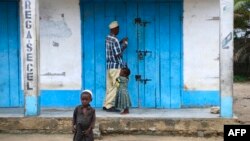On Friday, the U.S. embassy in Mozambique issued a security alert, warning all U.S. citizens to avoid visiting the Palma district in Cabo Delgado province, and urging those already there to “consider departing the area immediately.”
The embassy issued the warning “in light of information pointing to the likelihood of imminent attacks on government and commercial centers in the area.”
In the past two weeks, Mozambique has witnessed at least three brutal attacks by armed militants that police have linked to an Islamic group in the northern part of the country. This alarming rise of terror attacks has caught experts and policy analysts by surprise.
“I was surprised it happened as quickly as it has,” says Alex Vines, head of the Africa Program at Chatham House, the Royal Institute of International Affairs in London. “There’s [been] a real deterioration since October of last year.”
Mozambique experienced its first jihadi terror attack in October 2017, when militants attacked a police station and a military post in the coastal town of Mocimboa da Praia, killing two policemen.
Former U.S. Assistant Secretary of State for African Affairs Johnnie Carson says he was also a bit surprised by the emergence of violent Islamist groups in Mozambique, but added that extremist ideology had been spreading along the East African coast.
“I guess I shouldn’t be too surprised that it seems to be creeping a little bit down the coast,” he said.
Brutal killings
In the latest attacks blamed on the group known as Mozambique al-Shabab by the government, militants, armed with knives and machetes killed five people in the Quissanga district of Cabo Delgado on the night of June 6.
A day earlier, seven people were hacked to death in Macomia district, while more than a 100 houses were torched.
On May 27, 10 people, including children, were decapitated after they were allegedly abducted from the villages of Monjane and Ulumbi, near the coastal town of Palma, also in Cabo Delgado.
“These attacks appear to be locally driven,” says Wendy Williams, adjunct research fellow at the Africa Center for Strategic Studies in Washington. “Leadership ... appear to be recruiting mainly by appealing to local grievances of unemployment, social exclusion, and lack of basic public services.”
Local grievances
Mozambique’s coastal province of Cabo Delgado, which borders Tanzania, will soon become the country’s natural gas hub, after the discovery of vast offshore gas deposits. The country has started developing the infrastructure needed for extraction.
But according to some experts, people in the area feel they are being left out of this economic boom while the little they have in the form of land is being taken away without adequate compensation.
Carson, a U.S. Institute of Peace senior advisor, says it’s this feeling of marginalization that’s driving the insurgency in northern Mozambique.
“I think that these new developments are helping to fuel the insurgency. These gas deposits have brought with it ... the thought of greater economic prosperity. But that prosperity is not largely seen by local people,” he said.
Vines says failure to manage these local expectations is helping fuel the insurgency.
“And that’s where ... smuggling, religious networks and others have then provided these poorly educated and marginalized youths with a framework to oppose what they see as a very corrupt establishment and state,” he said.
Road to radicalization
Government figures indicate about 18 percent of Mozambique’s nearly 30 million people are Muslims. The vast majority of the Muslims follow the Sufi creed, which is a relatively tolerant form of Islam, but appears to have changed somewhat.
“It’s been a pretty tolerant place to be honest, but since 2015, research coming out of Cabo Delgado suggest that radicalization happened quite quickly,” said Vines.
Williams says this radical form of Islam, may have come into Mozambique from the north.
“… Considering how Tanzania has its own share of radical preachers and groups, it is not hard to imagine the ideology could have crossed the border into Mozambique at some point,” she said.
Way forward
Vines says the surge in terrorist attacks in Mozambique is still a local issue that should be carefully handled before it becomes internationalized.
“My sense of this is that it’s still about local issues. There’s still time to work against internationalizing this,” said Vines.
“The government should also tackle this extremism by addressing the socioeconomic grievances of the communities of Cabo Delgado,” said Williams. “Involving the community is key. Giving them a voice will help mitigate the sense of alienation.”






